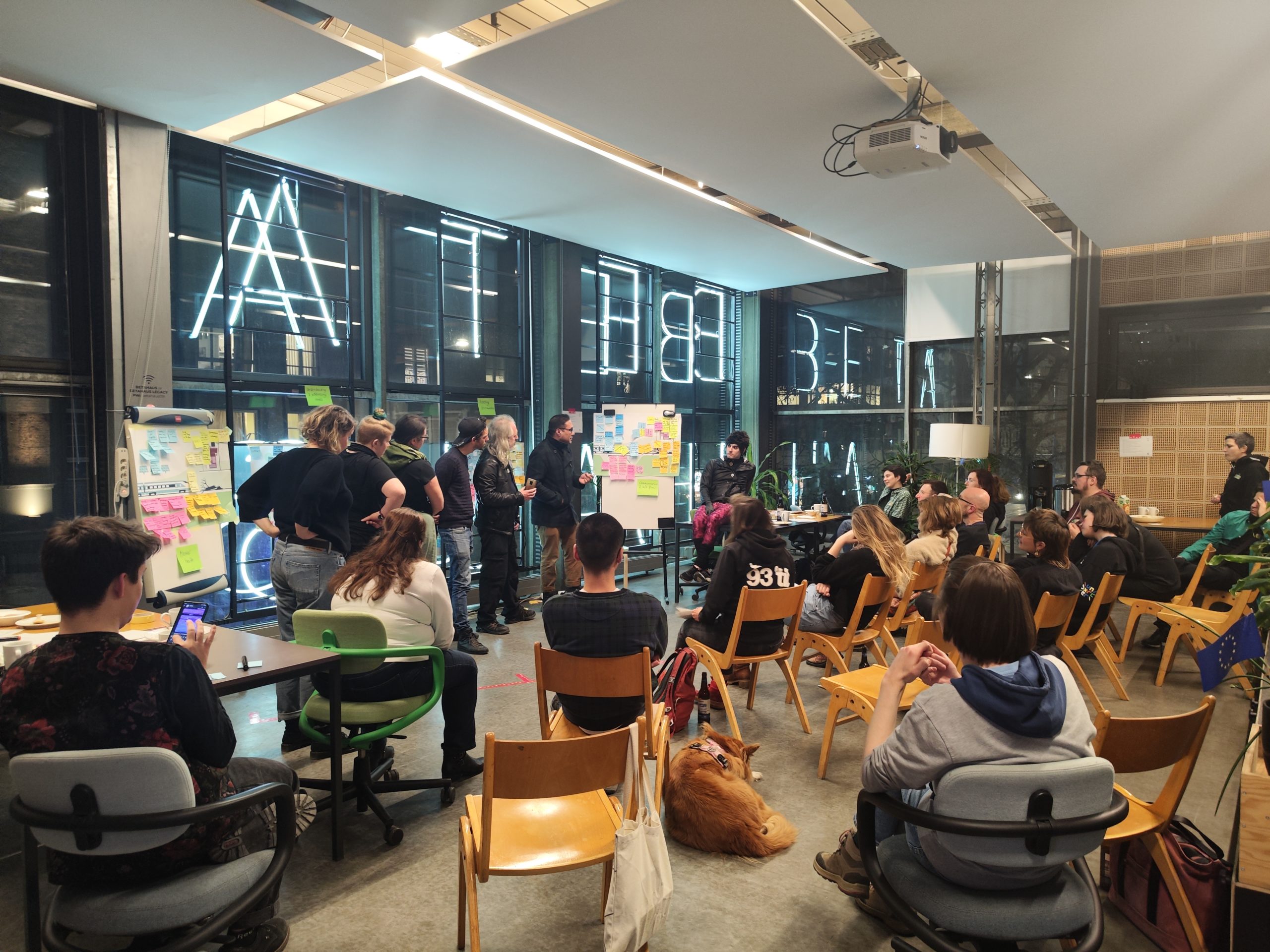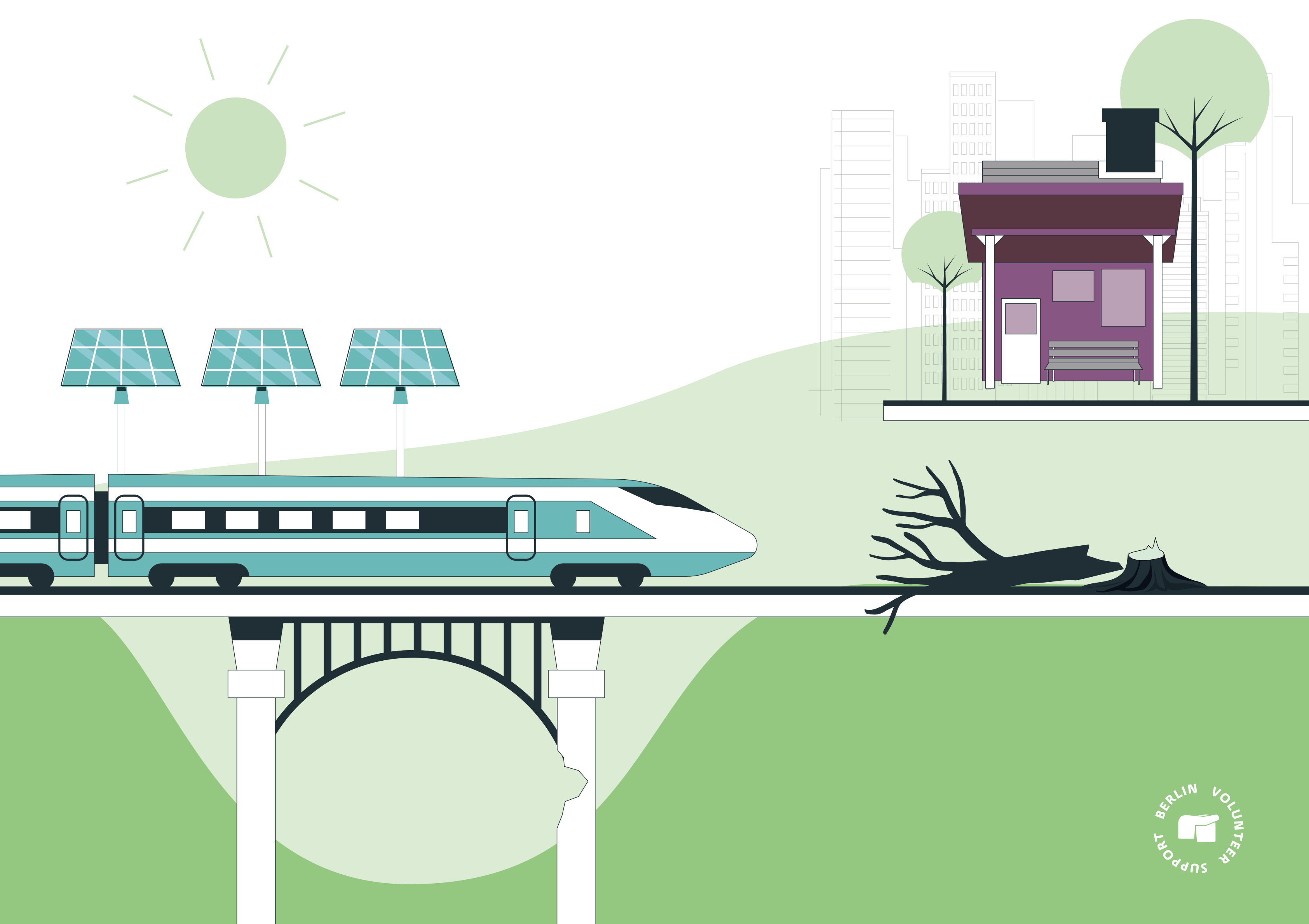Seminar: Reflecting on Arrival Support
On the 17th of March, BEVOS hosted a seminar for volunteers who were or still are active with Berlin Arrival Support (BAS). BAS is a collective of volunteers that emerged at the three main arrival points in Berlin (HBF, ZOB, SuedX) to help refugees fleeing from Ukraine. Since February 2022, volunteers have been united in providing direct non-bureaucratic support to all arriving refugees from the Ukraine. The voluntary work from BAS creates not only a more personal arrival process, but provides refugees support where state structures lack.

Our aim
The purpose of this event was to reflect about our voluntary commitment at the train and bus stations, through breakout sessions. This was and is particularly important because we do not have time to reflect while volunteering. Further, we wanted to receive different perspectives about issues. The breakout topics were derived from a questionnaire BEVOS conducted with BAS coordinators and volunteers.
During the seminar, the participants were asked to join a break-out group about the topic they wanted to discuss in detail. Participants decided to discuss the following topics:
The method
We took about one hour to prepare a presentation of the outcomes of the above mentioned break-out topics. In order to present them we chose the form of a “train retrospective”. It is a technique in which breakout teams can envision the topic they’ve chosen in a visual metaphor according to these specific categories:
-
- The train represents the overall breakout topic.
- The crack in the bridge represents the risks we our train encountered during our voluntary work with arriving refugees.
- The fallen tree represents what kept our train in the same place or, what held us back.
- Solar energy (solar panels) can propel our train forward, and represents what went well and what gave our train energy.
- Finally, the station is where your train is heading. It represents our goal or vision, but it could also be the motivation which kept us going.
Our outcomes
These following points and key words were written down by us on post-its. We did not change any of the wording or content, except that we summarized the open discussions after the presentations and added the points made.
SUPPORT
RISKS
GOALS
HINDRANCES

RISKS
Understanding and addressing the needs of refugees
What risks did we face when we were helping refugees?
- Misunderstanding/misinterpreting the goal of the arriving refugees
- Self-sacrificing
- No time limits (unlimited shifts)
- Not knowing where to stop helping
- Creating points of tension
What hindered us in understanding the needs of refugees?
- Lack of trust
- Lack of representative authorities (a general wish for more collaborative work between volunteers and the government was addressed)
- Communication with authorities
- Lack of support
- Limits of support
- People not knowing themselves
What helped us to understand the needs of refugees?
- Diversity in the volunteering community
- Support is people, so higher numbers of volunteers
- Native language speakers
- Supply group
- IT support, especially relevant and new information
- Psychological support
- Taking care of each other
- Establishing networks between volunteers and organizations, groups, Vereine etc. that were reliably supporting the same target groups
What is our goal in addressing the needs of refugees?
- Keep going
- Keeping up the moral
- Staying safe
- Set help limits & boundaries
- Managing expectations
- Care of basic needs
- Safety for refugees
Avoiding discrimination/discriminatory behavior
What risks did volunteers and refugees face at the train/bus stations?
- Adding to trauma → retraumatizing refugees or volunteers
- Disincentivizing volunteers
- Exposing subgroups/minorities
- Roma were mostly discriminated against among all the groups
- Misjudging/mischaracterizing a situation
- Selective solidarity: refugees vs. other groups which are also in need of help
- Mistrust in people and situations
- Legal punishment for volunteers
- Not knowing other volunteers around yourself well enough
- Volunteering was/is open to everyone
- Being questioned fo what we do/being confronted with resistance for breaking “hierarchy” of refugees
- The urge not to discriminate leads to giving/denying people access to spaces in a way that might hurt other people
- Human trafficking
What hindered volunteers in their work and were there obstacles to overcome?
- Avoiding disincentives for returning volunteers
- Noone clearly taking on a role (coordinators for issues related to discrimination)
- Volunteers acting discriminative
- If refugees had a need but could not express it which led to isolation
- Volunteers having different beliefs/opinions about discriminatory behavior
- Fear
- Administration & policies which were/are discriminatory in itself (e.g. asylum status)
- Other refugees taking up “too much” space so others were not seen
- Unconscious bias
- White savior complex leads to expecting refugees to be grateful for help
- Unintended discrimination
- Cultural differences
- Fastly changing environment & decision making under time pressure (think in boxes)
- Refugees would discriminate against volunteers, e.g. BIPOC & LGBTQ+ volunteers
What helped us to overcome/handle/prevent discriminatory behaviour/discrimination?
- Group cohesion
- Diversity among volunteers
- Understanding cultures (discussions with volunteers & refugees)
- Very open and caring community
- We had each other to help us make a clear stand in dealing with uncomfortable situations
- Experience in volunteering/dealing with situations
- Volunteers became friends
- Looking/thinking/acting different
- Self-discipline
- Putting yourself in other situations
- Motivation to volunteer embedded in anti-discrimination
- Being attentive/more attention for refugees travelling alone, who are disabled, minorities in general
- Be(come) open minded
- Firstly understanding, secondly acting
- Clear anti-discrimination policy
What is our vision when we talk about avoiding discrimination?
- Empathy & tolerance
- Someone stepping in for others
- To help as many people as possible
- To share people kindness in tough situations
- Not assuming anything about the people arriving/situations
- Trust
- Everybody feeling save and that his/her needs are addressed
- Sensitivity to refugees in their intersectional experience
- Clarity on consequences & boundaries
- Creating a welcoming space for all
- Courage to address discriminatory tendencies & behaviors
- Finding out how to offer “safe spaces”
- Not adding discrimination to already existing discriminatory experiences
- Self-reflection
Mental health of volunteers
What were the risks for volunteers and refugees in regards to their mental health?
- Mental overload for translators: PTSD, panic attacks, trigger points, retraumatization, too high stress level in general
- Volunteers leaving unnoticed, no information if they’re okay (people not showing their mental challenges)
- Taking problems home after volunteering, issues with distancing yourself
- Feeling helpless, not knowing how to solve individual problems
- Daily jobs seem meaningless
- Becoming different at some point/people were changing
- Constant guilt to do more, but also addictive, makes your work feeling “more” due to adrenaline and reactions
- Helper-mode, can’t turn off the mode
- Being native language speaker: translators understood everything, so they had the face the “most” mental health problems
What hindered us in taking good care of our mental health?
- Lack of self-reflexion/no time for self-reflexion
- Unusual, unique and extreme situations
- Not taking yourself seriously, your problems seem relative in comparison to refugees
- No mental health supporting structure
- Open structure with no record (volunteers are leaving, we can’t take care of the properly) – no documentation, no way to keep track
- Not enough volunteers to dispense the amount of work accordingly
What helped us in taking good care of our mental health?
- Family, friends, colleagues, fellow volunteers – sharing your experience
- Journaling
- Volunteering saved the mental health – better than not helping at all (feeling powerless at home, inactive)
- Support by therapists/life coaches
- Taking some time out (sports and other hobbies)
- Sticking to a routine outside of volunteering
- Learning about your own boundaries and setting them right
What is our goal in regards to mental health while volunteering with refugees?
- Bring nice stuff to the stations (tea, food, etc.)
- (Encourage) building a connection to others – communicate better to build groups trusting relationships between volunteers
- Upon agreement take personal contacts to check on them if they’re not present for a longer period of time
- Regular exchange among volunteers – better communication, trust circle, supervision
- Support by a professional psychologist
- Establishing a better structure (shift system, people who are in charge, limit work time) → IT support
- Learn about your own boundaries – briefings & workshops (reduce questions to refugees and better protect yourself from overload)
- Access to information about specific problems of the refugees (reduces helplessness and being overwhelmed) → handbook
Communication and information flow
What risks did we face regarding communication and information flow?
- Who is “worth” to know what?
- Hierarchy in different chats (not everyone had access to every chat) which leds to invisibility of information
- Different access and contact to decision makers
- Several times per day changing information which led to fatigue
- False information
- The urge to tell people the truth even though we don’t know what the truth will be and how it will be portrayed
- Translators “old! Volunteers not involved but do things on their own
- Double communication lines
- Opportunities for exploitation
What hindered us in receiving/passing on the information needed?
- Nobody knows what will happen tomorrow
- DB, Senat, other instances: daily changing situations
- Too much information in general
- Language barriers
- Outdated websites of partners/institutions
- People with genuine misbelief in wrong information
- People who doesn’t “fit” in the “minimum asylum process”
- Limited time of volunteers
- No decision/agreement about who is vulnerable
- External influences
- Bureaucracy
What helped us to receive/pass on the information needed?
- On boardes → websites & support
- Social media channels & chats
- Easy access to information via Telegram & messaging → group chats
- QR tasks
- Activities on several chats → large pool of knowledge, resources & know-how
- Crowd knowledge
- Unified organization
What is our goal in regards to communication and information flow?
- Data privacy & security
- Having all information on time before mistakes can happen
- Perfect information flow
- Everyone gives right answers
- Every question can be answered
